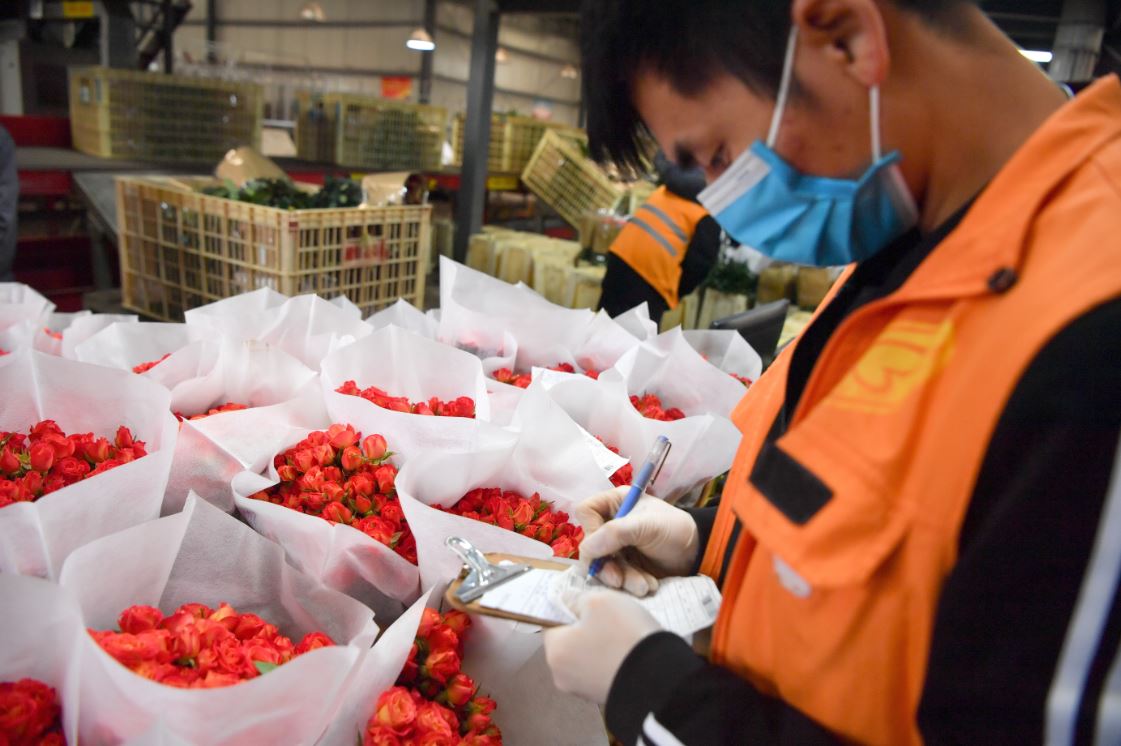Testing times for florists as revenue streams wilt


Vendors stare at big losses during usual peak season period as consumption falls due to transport constraints, virus outbreak
To lower the influence of the novel coronavirus epidemic on business, Chinese flower merchants are taking active steps to find a way out through both flower imports and exports and domestic sales while seeking to maintain a positive frame of mind during the special period.
Valentine's Day on Feb 14 is normally a "carnival" for flower sellers from China. This year though, the epidemic has suspended transport flights while keeping most people at home. This meant plunging demand and difficult times for flower vendors.
"Currently, the flower transportation capability related to the Chinese market is reduced to 10 percent of the normal level. Consumption of flowers, not like daily necessities, is greatly affected during the special period," said Guo Yanchun, the top executive of the Chinese general agent of Netherlands-headquartered flower care producer Chrysal.
"Our company majors in flower care products, which are relatively easy in stocking. We are already experiencing the influence of the epidemic. However, the influence for the fresh-cut flower enterprises is even bigger," she said.
Chen Yingxu, general manager of Beijing Jing Ke Hong Xiang Import and Export Trading Co Ltd, said the shipment of roses that were supposed to be transported to China between Feb 6 and Feb 9 are yet to be shipped due to several flight cancellations.
"We haven't calculated the loss yet. In one of our bases in Beijing, a batch of flowers which is worth nearly 70,000 yuan ($10,033) was forced to be stored. We don't know when the flower market will reopen. If the situation doesn't get better, the whole batch will be scrapped," Chen said.
In the domestic market, Dai Tangtao, a flower merchant in Southwest China's Yunnan province, said that "due to the virus outbreak, our business is not as good as that of last year. As people are all staying at home, there will be fewer consumers."
Data from the Dounan Flower Market in Yunnan, the largest fresh-cut flower market in Asia, showed that between Jan 27 and Feb 5, trade volume in the market slumped. The auction transaction volume was 431,500 yuan, which was merely 4.78 percent compared to the same period in 2019.
Currently, fresh-cut flowers from Yunnan take up 70 percent of the market share in major cities in China. It is also exported to 46 countries and regions worldwide.
"As sales during the Valentine's Day normally account for one third of that of the whole year, it is estimated that the loss of Yunnan's flower industry, including supporting industries such as logistics, during the special period will reach 3 billion yuan to 5 billion yuan," said Wang Jihua, deputy director of the Yunnan Provincial Academy of Agricultural Sciences.
He noted that the Flower Research Institute under the academy is now offering free consultation services to floriculturists in Yunnan to help them stabilize plantation and production, and resume operations when the epidemic ends.
On Feb 10, Dounan Flower Market resumed flower auctions, having been shut down for several days due to the novel coronavirus outbreak.
Wang said the reopening of the market will make up for some of the previous losses.
"Although both the number and amount of transactions declined compared to the same period last year, in the medium-to long-term, practitioners are still confident about the flower market," Wang said.
"The country is experiencing high-quality economic growth, and generally speaking, the flower industry is quite profitable. With the improvement of the epidemic prevention, consumption during special occasions such as the upcoming Women's Day, will see a resumption of growth and offset the previous losses," he said.




































